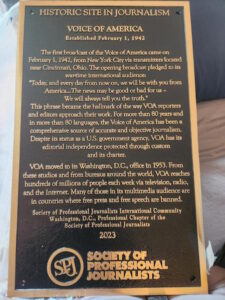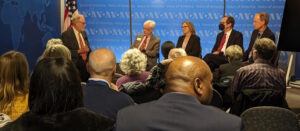
Back in 2022 the SPJ declared the headquarters of the Voice of America as a Historic Journalism Site in honor of the VOA 80th anniversary. After a number of delays, the plaque was unveiled Feb. 1 in the main entrance of the VOA.
 In addition to the dedication ceremony, the SPJ International Community organized a panel discussion on the “Legacy and Future of VOA.” The panelists were former VOA directors, Amanda Bennett, David Ensor and Sanford J. Ungar. Acting director John Lippmann was also on the panel. Former SPJ national president Steve Geimann moderated the discussion.
In addition to the dedication ceremony, the SPJ International Community organized a panel discussion on the “Legacy and Future of VOA.” The panelists were former VOA directors, Amanda Bennett, David Ensor and Sanford J. Ungar. Acting director John Lippmann was also on the panel. Former SPJ national president Steve Geimann moderated the discussion.
The Washington DC SPJ chapter provided light refreshments for the event.
Following the dedication and panel discussion, the VOA provided tours of the VOA studios and offices for event attendees.
International Community co-chair Dan Kubiske opened the dedication ceremony. He said the first broadcast of what is now the Voice of America came as in the middle of World War II, quoting the words of that broadcast – words that are also inscribed on the plaque: “[W]e shall speak to you about America and the war. The news may be good for us. The news may be bad. But we shall tell you the truth.”
Kubiske said since the 1942 first broadcast, legislation and presidential decrees have enshrined the editorial independence of VOA reported and editors. He noted that the SPJ has long been in the forefront of the battle to defend editorial independence and would continue to do so.
In closing, Kubiske said, “I hope that people in future will read the words here and fully appreciate how vital VOA is and how it lives up to the highest standards of ethical and independent journalism. In the meantime, the staff of VOA can look at this plaque each day when they come to work and know the SPJ has their back.”
Acting VOA Director John Lippman thanked the SPJ for the historic site designation.
Following the dedication and before the panel discussion, a video greeting from SPJ national President Ashanti Blaize-Hopkins was played to the audience. She congratulated the VOA on receiving the historic site designation and wished them another 80 years of great journalism.
After providing a brief history of the VOA and introducing the distinguished panel, Geimann opened the discussion by asking each of the former directors to identify the highlights of their terms in office.
 Ungar immediately went to his 1999 trip to Bangladesh as director. He noted that since his visit, visiting Bangladesh became a routine part of all subsequent VOA directors. Ungar said he was overwhelmed by the positive reception he received.
Ungar immediately went to his 1999 trip to Bangladesh as director. He noted that since his visit, visiting Bangladesh became a routine part of all subsequent VOA directors. Ungar said he was overwhelmed by the positive reception he received.
David Ensor said during his tenure VOA had its largest expansion of African coverage in 2014. He recalled visiting Mali soon after VOA began its broadcasts there. He said he got a dramatic lesson as to how popular VOA was as he was driving through the streets of the capital city one evening. “All the windows were open and you could hear Voice of America playing in every house in the entire city,” he said.
He also noted that at that time, there were strong efforts in Congress to do away with VOA. “It was a ‘To be or not to be’ moment in our lives,” he said. He noted that even as he was defending VOA before Congress, listenership was reaching record levels during his tenure.
Bennett, who is currently the CEO of the VOA parent body, the US Agency for Global Media, noted that the people in Bangladesh still talk about Ungar’s visit. She noted that her current position often prevents her from visiting the VOA main building as often as she would like. “I miss you guys a lot,” she said, pointing to some VOA reporters in the room, “but now I am now on the other side of the firewall, and I think that is a good thing.”
 Bennett also noted that VOA is respected globally for its editorial independence. “For much of the world,” she said, “VOA is press freedom.” Bennett and each of the other panelists all commented on how VOA was not only bringing unfiltered news from around the world to local audiences, but also, for many places, it was providing the only uncensored local news the people could hear.
Bennett also noted that VOA is respected globally for its editorial independence. “For much of the world,” she said, “VOA is press freedom.” Bennett and each of the other panelists all commented on how VOA was not only bringing unfiltered news from around the world to local audiences, but also, for many places, it was providing the only uncensored local news the people could hear.
The panelists said the current political campaign could mean VOA will once again face a threat to its existence. The threats can come from Congressional budget hawks as well as from national political figures who have expressed a desire to remove the editorial firewall from VOA.
Bennett said protecting the editorial independence of VOA remains a priority. “Every day, no matter what we know is up ahead, we should be strengthening and practicing that independence,” she said. “It is the fundamental, existential fact of our existence.”
The VOA headquarters is slated to be moved to a more modern building in the near future. When the move takes place, the SPJ plaque will be put in small park on Independence Avenue, just across from the future site of the Memorial to Fallen Journalists.
A video of the panel discussion is available at the SPJ International Community YouTube Channel along with comments and remembrances of other former directors who could not attend the ceremony.
